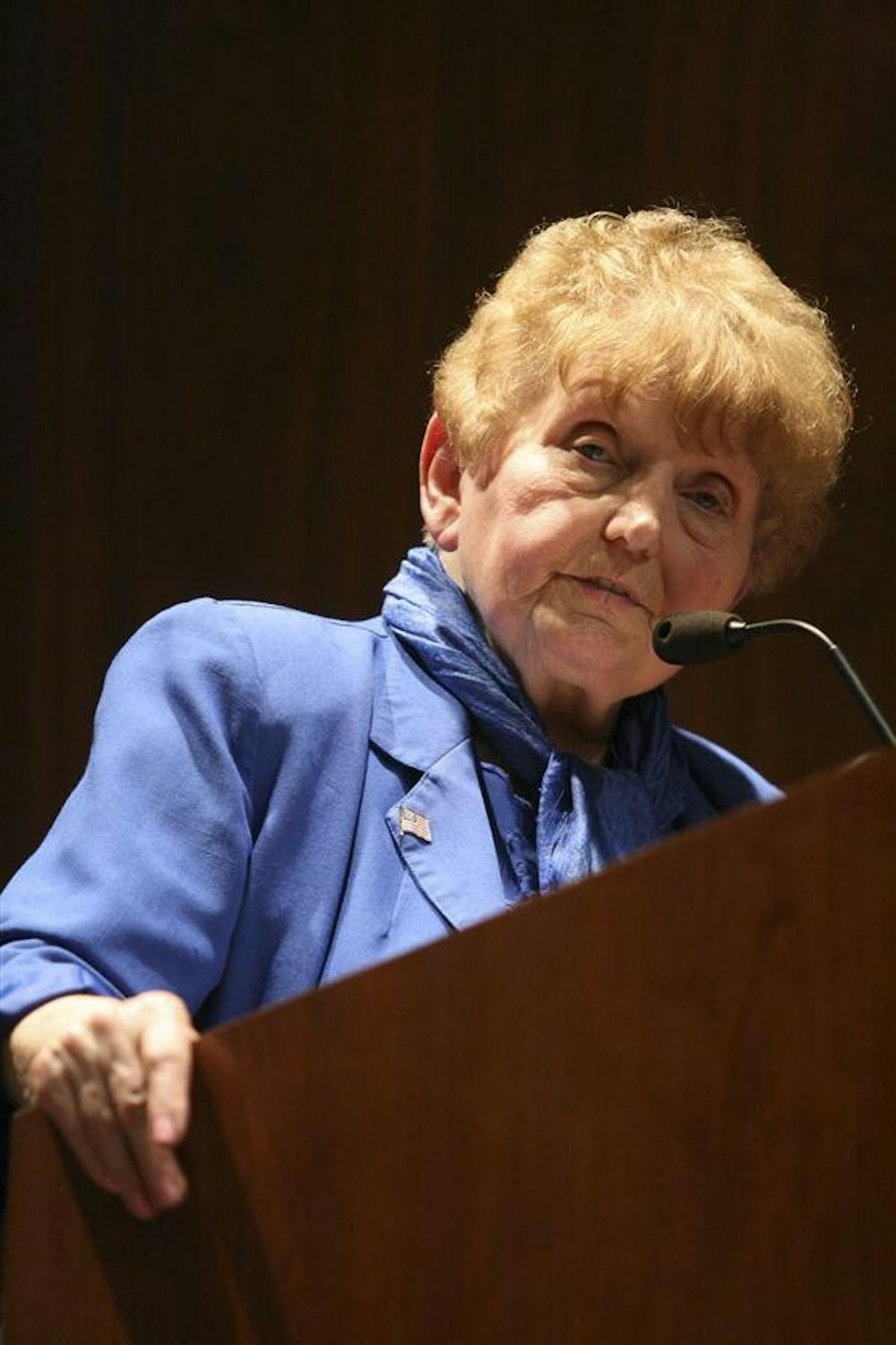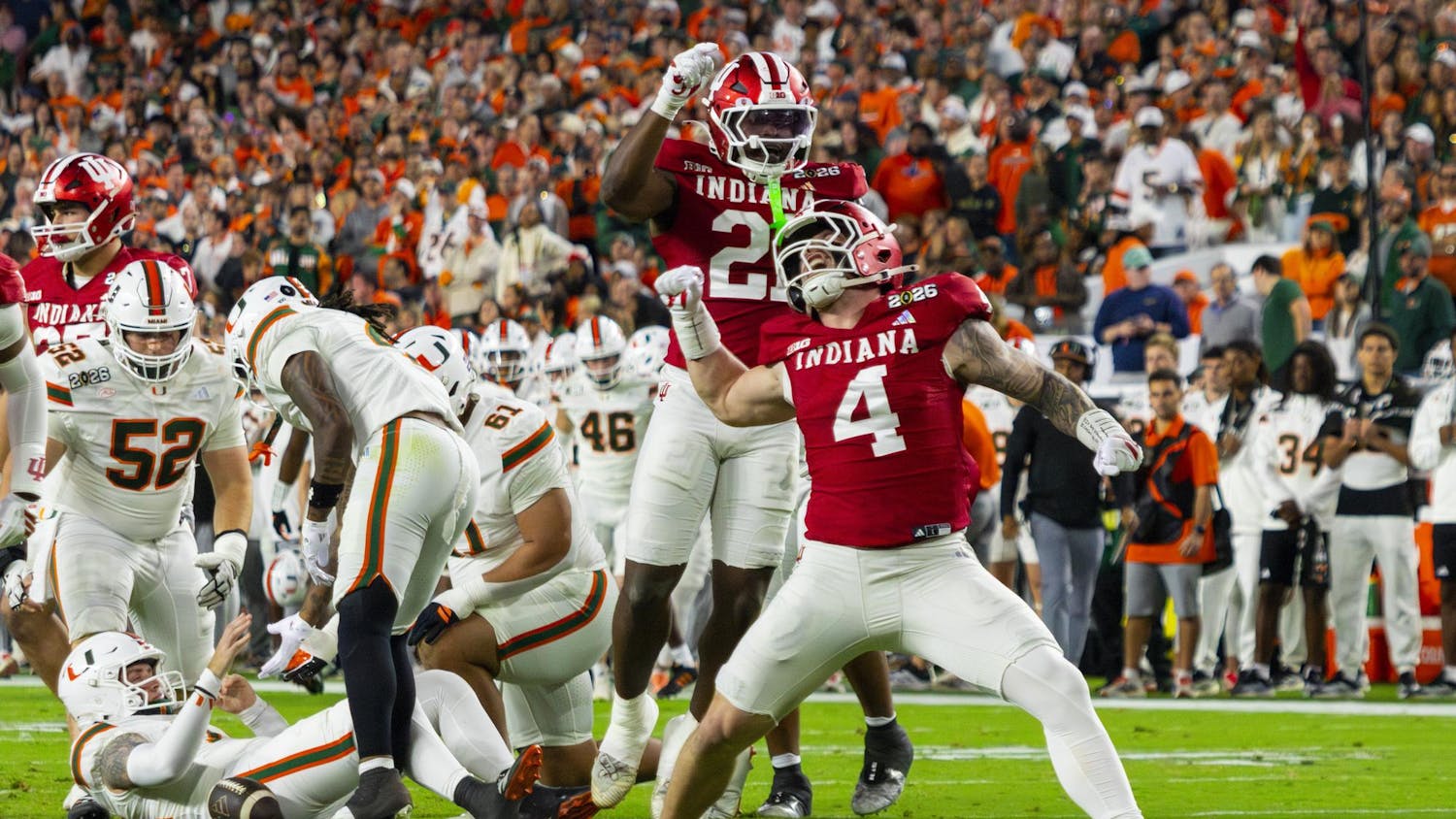What began as the tragic story of the cruel treatment of twins in Auschwitz ended as a story of forgiveness as Eva Kor, a Holocaust survivor, took the stage in front of an overcrowded Whittenberger Auditorium on Wednesday night.
Kor began her speech by describing the last moments she had with her family as they were split apart when they arrived in Auschwitz.
“My mother held on to Miriam and I,” she said, “hoping that as long as she could hold on to us she could protect us.”
Unfortunately, Kor’s mother was separated from her twin children, and Kor never saw her again. From then on, the twins became part of Dr. Josef Mengele’s experiments.
From the beginning, Kor remembers rebelling against the Nazis that tortured her and all the children in the camp. When they approached her to tattoo a number on her, she resisted.
“I decided I would not allow them to do what they wanted without a fight,” she said. “Four Nazis held me down with all their strength.”
After realizing that death was close by, Kor made a pledge that she and her sister would not end up dead.
Kor described two different labs that the children were subjected to.
The first was an observation lab, in which they would have to stand naked from six to eight hours as doctors measured and compared the twins to charts. Although she said there was no physical harm in this, the experience was demeaning.
The blood lab was a different story. Blood was taken out from their arms and unknown substances were injected into their bodies. Kor fell ill after this and was taken to the hospital, a place she knew no one came out of alive.
She then made a second pledge, promising herself that she would survive and be reunited with her sister. Miriam had been put in isolation as they waited for Kor to die.
Five weeks later Kor was taken back to the camp and with her sister again.
“I spoiled the experiment,” Kor said. “I survived.”
It would be nine months before her first pledge would become a reality, but in 1944, Kor and her twin sister were free. Unfortunately, Miriam died from cancer in 1993 as a result of the experiments.
Junior Genevieve Postlethwait, co-president of IU STAND, said she looked forward to meeting Kor and hearing what she had to say.
“One of the main things we do is try to educate students about genocide and when we came across Eva we knew she would be fascinating,” Postlethwait said. “There’s not many people in the world with her experience.”
Postlethwait said they wanted to make the event as large as possible, which prompted them to team up with Union Board.
Kor recognized that she is one in a small group who survived what she did and is still willing to speak about it.
“The experience of a child in camp is different,” she said. “I felt and saw that the whole world was like Auschwitz. It took every ounce of my energy to survive another day.”
Sophomore Meghan Oglesby, who met Kor in middle school, came to see her again.
“I like how although it was heart-wrenching, it was also light,” she said of Kor’s speech. “It’s such an amazing story and she is so avid about speaking about it.”
Kor said she has learned many things from her life.
“I know as I look at many of your young faces that growing up is very hard,” she said. “I remember it. Everyone wants to figure out how you fit into this big, mixed up world.”
She shared her first lesson: Never give up. Her second was to work against prejudice and to treat people fairly. She demonstrated the effects of this by comparing it to everyone going to a bridge and dropping a rock one at a time into the river.
“Everything we do in our lives every day touches the ripple of another,” she said.
Her last lesson, one that took her the longest to learn, was forgiveness. She said that 17 years ago she would not have believed she would someday forgive the Nazis. Yet she discovered that the power to forgive was something that no one could take away.
“I really think that’s definitely something that more people could benefit from,” Oglesby said.
Junior Paulina Rabell stood in line after the speech, waiting to buy Kor’s book and get her signature.
“The speech was mind-blowing,” she said. “It’s hard to describe it. I felt like crying and then laughing. To forgive the Nazis, that must have taken a lot of courage.”
Kor said forgiving is an act of self-healing, an act of taking control over your life.
“Anger is a seed for war,” she said. “Forgiveness is a seed for peace.”
A Holocaust survivor's story of forgiveness

Get stories like this in your inbox
Subscribe





